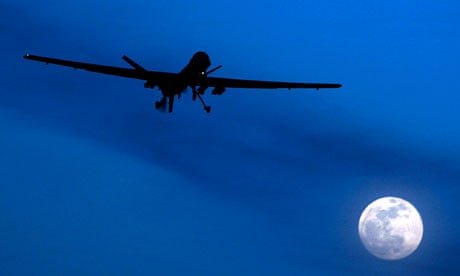RAF pilots flew armed US drones as part of Nato's military effort in last year's Libyan conflict, the Ministry of Defence has revealed.
The disclosure, slipped out in a parliamentary answer, comes 10 months after the end of a campaign in which the UK government had insisted no British drones, or Unmanned Aerial Vehicles (UAVs), were involved.
Though that remains true, the MoD has admitted RAF personnel on an exchange programme in the US flew American Predator drones, which were a key component of the air campaign.
The US announced last April it was deploying two patrols of armed UAVs above Libya and they launched numerous missile strikes against buildings, tanks and other military equipment being used by forces loyal to Colonel Gaddafi.
Between April and October the Predators conducted 145 air strikes in Libya, the Pentagon said. It is not known how many missions were flown by the British, or how many targets were destroyed by them.
The deployment of drones has become a hugely sensitive subject, primarily because of the way the Americans have used them for cross-border raids on Taliban and al-Qaida suspects in Pakistan.
Their use has provoked concern that many civilians have been caught during these air strikes – fears that were fuelled by a recent report in the New York Times which revealed the Obama administration's definition of potential targets.
Referring to the use of drones in Pakistan and Afghanistan, the NYT reported that the US regarded any adult male killed in a defined kill zone could be regarded a terrorist, unless posthumously proven otherwise.
An RAF source insisted that British pilots on exchange in the US would have followed British rules of engagement, not American ones. "If they were asked to go beyond their own nation's rules, then they would refuse to do so," the source said.
The MoD's acknowledgement that RAF pilots flew US drones came from defence minister Lord Astor. In an answer to a question on the issue published on Tuesday, he said: "Her Majesty's government do not use armed remotely piloted air systems against terrorist suspects outside Afghanistan. However, UK personnel flew armed remotely piloted air systems missions against Gaddafi's forces in Libya in 2011, in support of the Nato humanitarian mission authorised under UNSCR resolution 1973."
The MoD said it believed RAF pilots had only flown American drones over Libya, and had not done so in Afghanistan or Pakistan. The RAF has its own five-strong squadron of Reaper UAVs in Afghanistan, which are piloted by RAF personnel based in the US.
A spokesman added: "There were no and are no UK remotely piloted air systems operating outside of Afghanistan. The UK armed forces routinely embed UK personnel within allied nation units (and vice versa) via exchange programmes. As confirmed by Lord Astor, UK personnel embedded within a US unit flew armed remotely piloted air systems missions against Gaddafi's forces in Libya in 2011."
Chris Cole, founder of the website Drone Wars UK, told the Guardian: "The fact that it has been revealed that UK personnel controlled armed drones in the Libyan conflict last year – despite the repeated insistence by the MoD that the UK has only ever operated armed drones in Afghanistan – underlines the need for much greater transparency from the MoD about their use of drones.
"It also begs the question of course, where else are they being used? There is a real concern that the nature of these unmanned, remotely operated systems means they can be used to launch armed attacks clandestinely and without proper accountability. There is a now a clear need for proper parliamentary scrutiny of the development and use of armed drones by the UK."
In June the Guardian revealed that the British military was increasingly relying on unmanned drones to wage war against the Taliban. Figures show British UAVs fired more than 280 laser-guided Hellfire missiles and bombs at suspected insurgents.
In the past year alone, the remotely controlled Reaper aircraft have flown more than 11,000 hours over southern Afghanistan and attacked targets with 105 high-impact precision weapons.
